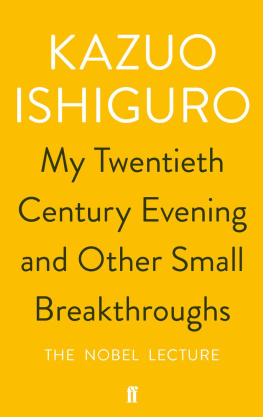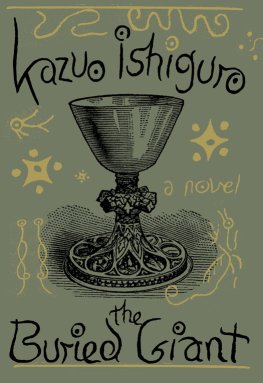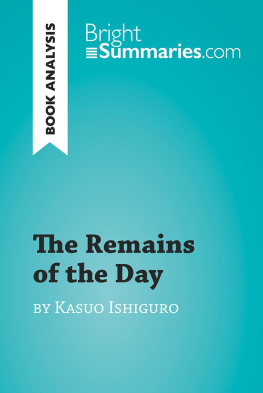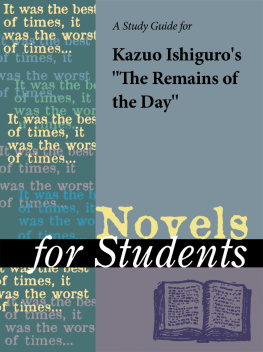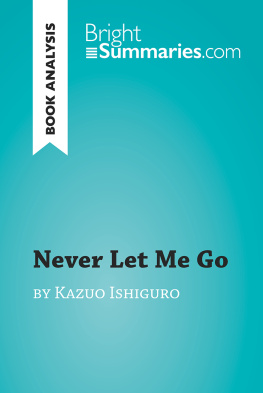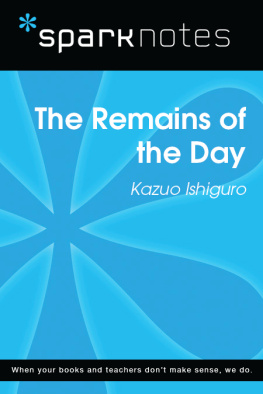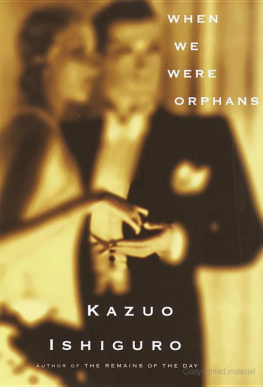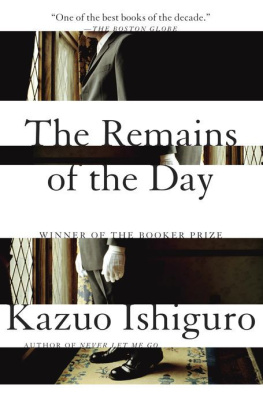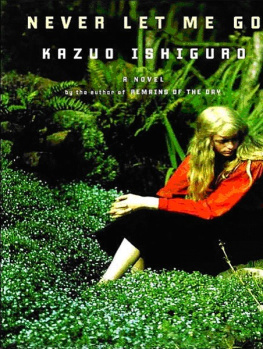The Nobel Prize in Literature 2017 was awarded to Kazuo Ishiguro who, in novels of great emotional force, has uncovered the abyss beneath our illusory sense of connection with the world.
If youd come across me in the autumn of 1979, you might have had some difficulty placing me, socially or even racially. I was then twenty-four years old. My features would have looked Japanese, but unlike most Japanese men seen in Britain in those days, I had hair down to my shoulders, and a drooping bandit-style moustache. The only accent discernible in my speech was that of someone brought up in the southern counties of England, inflected at times by the languid, already dated vernacular of the hippie era. If wed got talking, we might have discussed the Total Footballers of Holland, or Bob Dylans latest album, or perhaps the year Id just spent working with homeless people in London. Had you mentioned Japan, asked me about its culture, you might even have detected a trace of impatience enter my manner as I declared my ignorance on the grounds that I hadnt set foot in that country not even for a holiday since leaving it at the age of five.
That autumn Id arrived with a rucksack, a guitar and a portable typewriter in Buxton, Norfolk a small English village with an old water mill and flat farm fields all around it. Id come to this place because Id been accepted on a one-year postgraduate Creative Writing course at the University of East Anglia. The university was ten miles away, in the cathedral town of Norwich, but I had no car and my only way of getting there was by means of a bus service that operated just once in the morning, once at lunchtime and once in the evening. But this, I was soon to discover, was no great hardship: I was rarely required at the university more than twice a week. Id rented a room in a small house owned by a man in his thirties whose wife had just left him. No doubt, for him, the house was filled with the ghosts of his wrecked dreams or perhaps he just wanted to avoid me; in any case, I didnt set eyes on him for days on end. In other words, after the frenetic life Id been leading in London, here I was, faced with an unusual amount of quiet and solitude in which to transform myself into a writer.
In fact, my little room was not unlike the classic writers garret. The ceilings sloped claustrophobically though if I stood on tip-toes I had a view, from my one window, of ploughed fields stretching away into the distance. There was a small table, the surface of which my typewriter and a desk lamp took up almost entirely. On the floor, instead of a bed, there was a large rectangular piece of industrial foam that would cause me to sweat in my sleep, even during the bitterly cold Norfolk nights.
It was in this room that I carefully examined the two short stories Id written over the summer, wondering if they were good enough to submit to my new classmates. (We were, I knew, a class of six, meeting once every two weeks.) At that point in my life, Id written little else of note in the way of prose fiction, having earned my place on the course with a radio play rejected by the BBC. In fact, having previously made firm plans to become a rock star by the time I was twenty, my literary ambitions had only recently made themselves known to me. The two stories I was now scrutinising had been written in something of a panic, in response to the news that Id been accepted on the university course. One was about a macabre suicide pact, the other about street fights in Scotland, where Id spent some time as a community worker. They were not so good. I started another story, about an adolescent who poisons his cat, set like the others in present-day Britain. Then one night, during my third or fourth week in that little room, I found myself writing, with a new and urgent intensity, about Japan about Nagasaki, the city of my birth, during the last days of the Second World War.
This, I should point out, came as something of a surprise to me. Today, the prevailing atmosphere is such that its virtually an instinct for an aspiring young writer with a mixed cultural heritage to explore his roots in his work. But that was far from the case then. We were still a few years away from the explosion of multicultural literature in Britain. Salman Rushdie was an unknown with one out-of-print novel to his name. Asked to name the leading young British novelist of the day, people might have mentioned Margaret Drabble; of older writers, Iris Murdoch, Kingsley Amis, William Golding, Anthony Burgess, John Fowles. Foreigners like Gabriel Garca Mrquez, Milan Kundera or Borges were read only in tiny numbers, their names meaningless even to keen readers.
Such was the literary climate of the day that when I finished that first Japanese story, for all my sense of having discovered an important new direction, I began immediately to wonder if this departure shouldnt be viewed as a self-indulgence; if I shouldnt quickly return to more normal subject matter. It was only after considerable hesitation that I began to show the story around, and I remain to this day profoundly grateful to my fellow students, to my tutors, Malcolm Bradbury and Angela Carter, and to the novelist Paul Bailey that year the universitys writer-in-residence for their determinedly encouraging response. Had they been less positive, I would probably never again have written about Japan. As it was, I returned to my room and wrote and wrote. Throughout the winter of 197980, and well into the spring, I spoke to virtually no one aside from the other five students in my class, the village grocer from whom I bought the breakfast cereals and lamb kidneys on which I existed, and my girlfriend, Lorna (today my wife), whod come to visit me every second weekend. It wasnt a balanced life, but in those four or five months I managed to complete one half of my first novel, A Pale View of Hills set also in Nagasaki, in the years of recovery after the dropping of the atomic bomb. I can remember occasionally during this period tinkering with some ideas for short stories not set in Japan, only to find my interest waning rapidly.
Those months were crucial for me, in so far as without them Id probably never have become a writer. Since then, Ive often looked back and asked: What was going on with me? What was all this peculiar energy? My conclusion has been that just at that point in my life, Id become engaged in an urgent act of preservation. To explain this, Ill need to go back a little.
I had come to England, aged five, with my parents and sister in April 1960, to the town of Guildford, Surrey, in the affluent stockbroker belt thirty miles south of London. My father was a research scientist, an oceanographer whod come to work for the British government. The machine he went on to invent, incidentally, is today part of the permanent collection at the Science Museum in London.
The photographs taken shortly after our arrival show an England from a vanished era. Men wear woollen V-neck pullovers with ties, cars still have running boards and a spare wheel on the back. The Beatles, the sexual revolution, student protests, multiculturalism were all around the corner, but its hard to believe the England our family first encountered even suspected it. To meet a foreigner from France or Italy was remarkable enough never mind one from Japan.
Our family lived in a cul-de-sac of twelve houses just where the paved roads ended and the countryside began. It was less than a five-minute stroll to the local farm and the lane down which rows of cows trudged back and forth between fields. Milk was delivered by horse and cart. A common sight I remember vividly from my first days in England was that of hedgehogs the cute, spiky, nocturnal creatures then numerous in that country squashed by car wheels during the night, left in the morning dew, tucked neatly by the roadside, awaiting collection by the refuse men.

